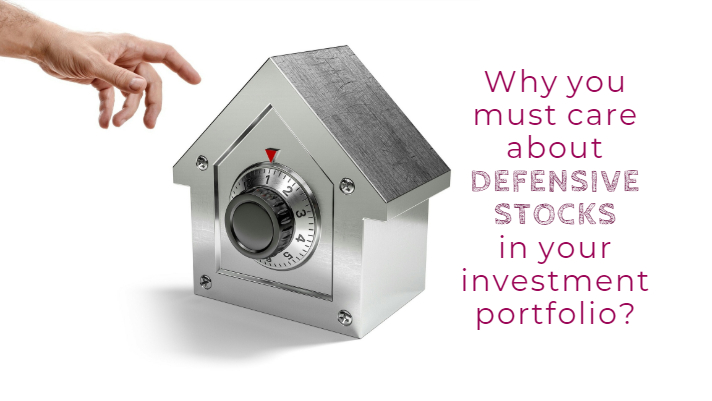Published : January 27, 2019

Holding defensive stocks is a strategy to minimise the risk of loss during the bear phase. Even in the situation of non-performance of the economy, these stocks provide a cushion to your portfolio.
We all are aware that stock market moves in a cycle. Bulls and bear market are phases of the stock market cycle. What worries any stock market investors is the bear phase of the cycle. As an investor, you do not care much when every stock in your portfolio performs or even in some case outperform the broader market. This typically happens in a bull phase.
In the bear market or in a situation when the economy as a whole is not performing, everyone one of us starts worrying with our stock market investment.
However, you always have options to part with your this worry. Here comes the role of judicious selection of stocks in your long-term portfolio to cushion such risks. Risks of losing your principal investments. Defensive stocks in your portfolio take cares of such external but natural risk.
“Defense” literally means “protection from harm”. Hence, when you apply this sense to your stock market investing, delivers an alike meaning. A defensive stock manages to give a stable return in every stock market condition. The situation like up movement, down movement or even sideways movement of the overall stock market.
The following are some of the important features of defensive stocks –
Cyclical stocks are stocks of the companies in businesses that obey the business cycle. Thus, their stock prices also accompany the same. Their products behave very well during economic expansions and underperform in recession.
Stocks of automakers, airlines, hotels, restaurants, apparel companies and the like are cyclic in nature. The simple logic is this. When an economy is sound and performing, more people manage to fly, stay in hotels, use restaurants frequently and buy new clothes more frequently. This results in strong sales and thus strong inflow of revenue for such companies. Further, resulting in the strong performance of their stock prices.
In contrast, comes, the defensive stock. Sometimes we also refer to such companies as “non-cyclic stocks”. These are stocks of companies that act likewise in terms of sales and profit in all economic situation.
Stocks of consumer durables, healthcare, utilities etc forms defensive stocks. During bad economic states, consumers rarely change their day to day shopping. Thus, revenue does not have a much deep impact due to such poor performance of the economy as a whole. So the profit also does not have much effect.
It is true that any defensive stocks perform better during recessions than in an expansion phase. Commonly, they perform below the market during the expansionary trend of the economy. The reason behind this lies on the fact that defensive stocks carry lower beta as compared to others.
Beta measures volatility and the systematic risk, of a stock in relation to a benchmark like Nifty 50 or Sensex. You can think the beta as a relative risk in the stock. Relative to the broader market.
Technically, typically any defensive stocks carry beta less than 1. For instance, suppose 0.5 betas of a stock. What does this mean to an investor? Let’s understand this. Forthwith, consider that the broader market is anticipated to drop by 12%. Besides assume, the prevailing risk-free rate of 4% in the economy. When the market adjusts in the due course than in that circumstances, a defensive stock will also correct. However, the revision will be less in relation to the broader market. It will fall only by 8% [0.5*(-12%-4%)].
In contrast, further, assume the market to rise by the same 12%. Also, the same risk-free 4% rate prevailing. Than the same defensive stock with 0.5 beta will rise by 4% [0.5*(12%-4%)].
Thus, a defensive stock performs better when the economy is not in good shape. While overall do badly when the economy is shining.
From the above, it is clear that defensive stocks are meant for investment during the recession. There are other situations as well where they behave well. Thus, if you find yourself in any of the following situations you should consider defensive stocks for you –
After understanding this, let us understand that what quantum of such defensive stocks you should hold.
Various phases of stock market confusing you? Don’t worry. Read this blog to get a deep insight into various phases of market conditions. This along with the concept of sector rotation –
This depends. Depends on your personal risk appetite. It is a well-known fact that all investments come with a certain level of risk. Also, higher the risk, higher the chances of profitability. This is the inherent characteristics of investments. So is with the stock market investments. Defensive stocks are among the least risk carrying among all category of stocks.
It is also true that in a situation when the market is rising, defensive stocks usually perform below cyclic stocks. So it is always good to reduce your defensive stocks holdings. But a piece of advice. Never, make it disappear from your portfolio. In all other situations, like falling market or sideways market situation, you must increase the proportion towards defensive stocks.
I am not considering any short to mid-term market condition for strategizing your investment plans here. It is always good to make a habit of long term investment and stick to any such strategy. This ensures healthy returns from your investments.
Now coming to our initial question. Question on what proportion of portfolio should be in defensive stocks. See, even if your 100% risk averse then also a 100% of the portfolio in defensive stocks will not do good. In fact, it will result in negative returns even in a falling market. The thing you need to keep in mind is that in falling market condition, these stocks fall less than in the whole class. So you need to have cyclic and other growth-oriented stocks as well in your portfolio.
Ideally, you should consider at least 10% of your portfolio to hold defensive stocks. Irrespective of the market situation. Also, without any loss, not more than 50% is advisable even in a bear phase. You must increase or decrease your holdings of these stocks in between this threshold.
Fundamentally, you can rely on defensive stocks during high volatility market periods. Broadly speaking, such stocks do not succumb much in value which in contrast, is popular with high beta stocks. Common during a time when there is a sharp correction in the market. Let us look at the characteristics of defensive stocks that makes them unique as a category.
Monotonous refers to uniform business. Uniform irrespective of economic conditions. The produces of such companies never go out of the market. Some sectors are specific that contributes mostly to the defensive stocks. This includes food, FMCG, banks, IT, utilities, healthcare etc.
When it happens to products and services from the defensive sector they may switch in their particular order. However, the products and services as a whole seldom go out of fashion. With the rising income levels in the economy, the product and services also observe an increase in their demand.
Usually, stocks from defensive sectors are less volatile among others. Furthermore, they are capable to protect price and returns throughout difficult times due to their stable nature.
In India, a share of companies like ITC, HindUnilever, SBI, Infosys, Britannia is classic examples of defensive stocks.
Always keep in mind that these stocks do not generate extraordinary above-normal returns. Even they are not multi-bagger stocks. In actual, they are capable to maintain and protect your investments throughout difficult economic or political conditions or both.
Always remember this. This is the ways how you will differentiate a stock to be defensive or not. Stocks from a sector that follows natural seasonal cycles or global commodity cycles can’t be defensive. Like stocks from oil and gas or metal and mining sector. Products from these sectors depend largely on the health of the economy. So they follow natural seasonality. Hence they do not qualify for defensive.
There is a handful of stocks on both NSE and BSE that maintain a history of regular dividend payment. Regular, irrespective of bull market or bear phase of the market. Even recession or expansion in the economy do not have any direct impact on their dividend outflows. Typically, such stocks are capable of 6-7% annual dividend yield. They also form perfect examples of defensive stocks. The dividend yield, thus, functions as a price support for such stock. Stocks like Hindustan Composites, Coal India, NHPC, REC, SBI, Bosch Ltd, etc. befall in this category.
Shares of ITC and Dabur is a good example of such companies with maturity and stable business. It is not so that during recession or bear phase their stock priced do not correct. They do correctly with along with others. However, the intensity of the fall is low when you compare it with others. Moreover, when the market starts recovering, they are the first to attain their actual values. So they are also capable of not letting your investment wear out in long run. Besides, it is always good to do equity SIP in such defensive stocks. Increase the size of your SIP when markets are down and decrease when the market is doing good. This will ensure your average cost to come down.
Low beta companies with a sound business model which are relatively undervalued are good defensive stocks. Undervaluation in terms P/E and P/BV. Companies like IOCL, BPCL, Cipla, ACC etc have valuations lower than their counterparts. Also, possess betas lower than one with good business models. Such stocks will defend your investments’ downside risk. So they may not fire like cyclic stocks in bull markets. Yet they will endure value efficiently when the markets are down or during high volatile periods.
Stock market investors have two broader objectives for every investor. Principal amount protection and a good return from the investment. This, irrespective of bull, bear or sideways market phases.
So, an ideal stock market investors should increase holding low-beta, defensive stocks in their portfolio. This is a common strategy when he expects a downturn in the market for sometimes. You must change this strategy with the change in the market situation from downturn to upturn. Thus, when you expect the market to prosper, as an ideal investor you should shift more of your investments with higher beta stocks.
Such an attempt to adjust investments will for sure help maximize your overall stock market return. Of course, there are many more things that as an ideal investor you can do to protect your investments and maximize returns. The above is a very basic and general strategy that you need to stick with when market scenario changes.

Enjoy flexible trading limits at
lowest brokerage rates ?
Open Your Investments Account Now
0Account Opening Charges
Life Time Demat AMC
Brokerage








IT'S TIME TO HAVE SOME FUN!
Your family deserves this time more than we do.
Share happiness with your family today & come back soon. We will be right here.
Investment to ek bahana hai,
humein to khushiyon ko badhana hai.
E-mail
askus@rmoneyindia.com
Customer Care
+91-9568654321